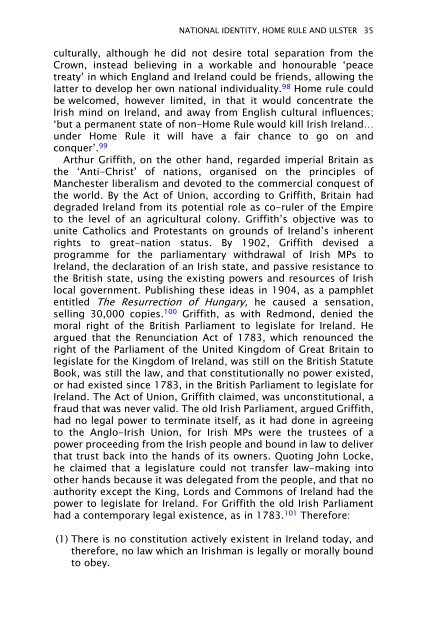Dividing Ireland: World War I and Partition
Dividing Ireland: World War I and Partition
Dividing Ireland: World War I and Partition
You also want an ePaper? Increase the reach of your titles
YUMPU automatically turns print PDFs into web optimized ePapers that Google loves.
NATIONAL IDENTITY, HOME RULE AND ULSTER 35<br />
culturally, although he did not desire total separation from the<br />
Crown, instead believing in a workable <strong>and</strong> honourable ‘peace<br />
treaty’ in which Engl<strong>and</strong> <strong>and</strong> <strong>Irel<strong>and</strong></strong> could be friends, allowing the<br />
latter to develop her own national individuality. 98 Home rule could<br />
be welcomed, however limited, in that it would concentrate the<br />
Irish mind on <strong>Irel<strong>and</strong></strong>, <strong>and</strong> away from English cultural influences;<br />
‘but a permanent state of non-Home Rule would kill Irish <strong>Irel<strong>and</strong></strong>…<br />
under Home Rule it will have a fair chance to go on <strong>and</strong><br />
conquer’. 99<br />
Arthur Griffith, on the other h<strong>and</strong>, regarded imperial Britain as<br />
the ‘Anti-Christ’ of nations, organised on the principles of<br />
Manchester liberalism <strong>and</strong> devoted to the commercial conquest of<br />
the world. By the Act of Union, according to Griffith, Britain had<br />
degraded <strong>Irel<strong>and</strong></strong> from its potential role as co-ruler of the Empire<br />
to the level of an agricultural colony. Griffith’s objective was to<br />
unite Catholics <strong>and</strong> Protestants on grounds of <strong>Irel<strong>and</strong></strong>’s inherent<br />
rights to great-nation status. By 1902, Griffith devised a<br />
programme for the parliamentary withdrawal of Irish MPs to<br />
<strong>Irel<strong>and</strong></strong>, the declaration of an Irish state, <strong>and</strong> passive resistance to<br />
the British state, using the existing powers <strong>and</strong> resources of Irish<br />
local government. Publishing these ideas in 1904, as a pamphlet<br />
entitled The Resurrection of Hungary, he caused a sensation,<br />
selling 30,000 copies. 100 Griffith, as with Redmond, denied the<br />
moral right of the British Parliament to legislate for <strong>Irel<strong>and</strong></strong>. He<br />
argued that the Renunciation Act of 1783, which renounced the<br />
right of the Parliament of the United Kingdom of Great Britain to<br />
legislate for the Kingdom of <strong>Irel<strong>and</strong></strong>, was still on the British Statute<br />
Book, was still the law, <strong>and</strong> that constitutionally no power existed,<br />
or had existed since 1783, in the British Parliament to legislate for<br />
<strong>Irel<strong>and</strong></strong>. The Act of Union, Griffith claimed, was unconstitutional, a<br />
fraud that was never valid. The old Irish Parliament, argued Griffith,<br />
had no legal power to terminate itself, as it had done in agreeing<br />
to the Anglo-Irish Union, for Irish MPs were the trustees of a<br />
power proceeding from the Irish people <strong>and</strong> bound in law to deliver<br />
that trust back into the h<strong>and</strong>s of its owners. Quoting John Locke,<br />
he claimed that a legislature could not transfer law-making into<br />
other h<strong>and</strong>s because it was delegated from the people, <strong>and</strong> that no<br />
authority except the King, Lords <strong>and</strong> Commons of <strong>Irel<strong>and</strong></strong> had the<br />
power to legislate for <strong>Irel<strong>and</strong></strong>. For Griffith the old Irish Parliament<br />
had a contemporary legal existence, as in 1783. 101 Therefore:<br />
(1) There is no constitution actively existent in <strong>Irel<strong>and</strong></strong> today, <strong>and</strong><br />
therefore, no law which an Irishman is legally or morally bound<br />
to obey.








